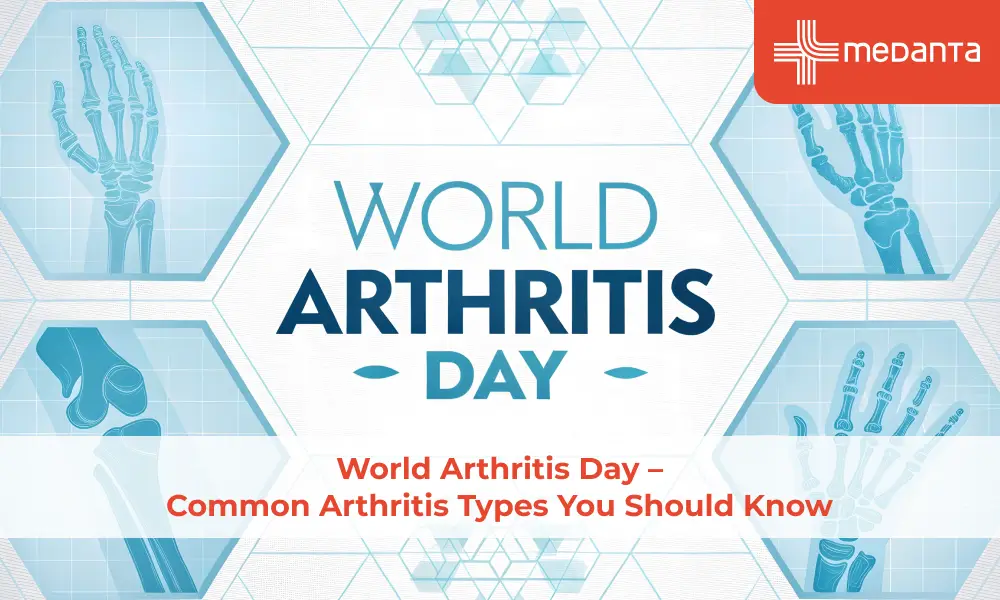World Arthritis Day – Common Arthritis Types You Should Know

TABLE OF CONTENTS
World Arthritis Day – Don’t Live with Arthritis Pain
Arthritis is a condition where your bones and joints tend to swell and become tender. The primary symptoms of arthritis are joint pain and stiffness of joints that feel worse in the morning and in cold weather. Arthritis-induced joint stiffness keeps getting worse as age progresses.
World Arthritis Day is the best time to know and spread awareness about arthritis, its types, symptoms, and treatment. The most common types of arthritis are osteoarthritis and rheumatoid arthritis. Each has its own set of causes, symptoms, and treatment plans.
Types of Arthritis
Here are different types of arthritis you should know about:
Osteoarthritis (OA): Osteoarthritis is the most common form of arthritis and is considered a degenerative joint disease. It occurs when the cartilage that cushions the ends of bones gradually wears down over time. This type of arthritis is usually related to aging, but it can also result from joint injuries, obesity, and a genetic predisposition. People with osteoarthritis often experience pain during or after movement, stiffness especially after periods of rest, a loss of flexibility, a grating sensation in the joint, and sometimes bone spurs. While there is no cure, treatment focuses on managing symptoms and improving joint function through physical therapy, medications, weight management, and, in some cases, joint replacement surgery.
Rheumatoid Arthritis (RA): Rheumatoid arthritis is an autoimmune disease, meaning the body’s immune system mistakenly attacks its own joints. This leads to inflammation, joint damage, and, over time, potential deformities. The causes of RA include genetic factors, immune system dysfunction, and environmental triggers such as infections or smoking. Common symptoms include swollen and tender joints, morning stiffness that lasts more than 30 minutes, fatigue, fever, and joint deformity in advanced stages. Treatment for RA includes disease-modifying antirheumatic drugs (DMARDs), biologic agents, corticosteroids, and anti-inflammatory medications. Early diagnosis and consistent treatment can prevent severe joint damage and help manage symptoms effectively.
Psoriatic Arthritis: Psoriatic arthritis is a form of arthritis that affects some individuals who have psoriasis, a chronic skin condition. It leads to joint pain, stiffness, and swelling, and can also affect the skin and nails. People with psoriatic arthritis may notice swollen fingers and toes, pain in affected joints, and red patches of skin topped with silvery scales. Treatments typically include anti-inflammatory medications, immunosuppressants, and skin-specific topical treatments to manage both joint and skin symptoms.
Gout: Gout is a type of inflammatory arthritis that results from high levels of uric acid in the blood. This excess uric acid can form sharp crystals in joints, causing sudden and intense pain. Gout commonly affects the big toe, but it can occur in other joints as well. Symptoms often include sudden attacks of severe pain, redness, swelling, and tenderness, particularly at night. Treatment usually involves anti-inflammatory medications, lifestyle and dietary changes, and medications that help lower uric acid levels in the body to prevent future flare-ups.
Ankylosing Spondylitis: Ankylosing spondylitis is a rarer form of arthritis that primarily affects the spine, although it can also impact other joints. It causes inflammation of the spinal joints, leading to chronic pain and stiffness. Symptoms often include persistent back pain that improves with movement but not with rest, morning stiffness, fatigue, and a gradual stooping posture in more advanced stages. Treatment options focus on regular physical activity, posture correction, anti-inflammatory medications, and physical therapy to manage pain and maintain spinal mobility.
This World Arthritis Day, Take Action
Arthritis doesn't have to control your life. On World Arthritis Day, let’s take a moment to recognize the impact of this condition and commit to early action. If you or someone you know experiences persistent joint pain or stiffness, don’t ignore it—speak to a medical professional. With the right support, information, and treatment, it's possible to lead an active and fulfilling life despite arthritis.






